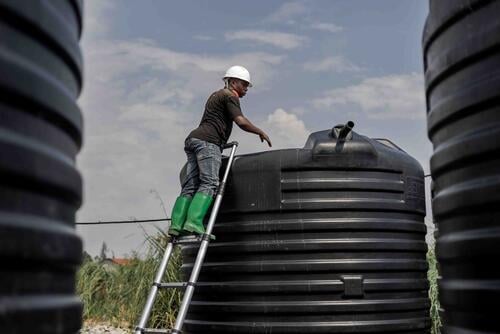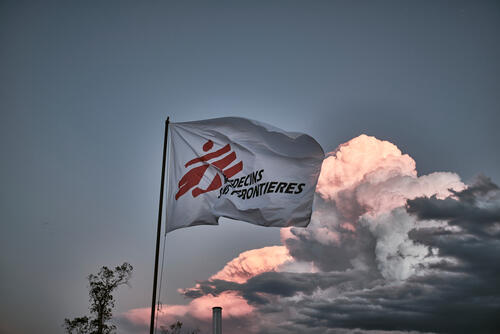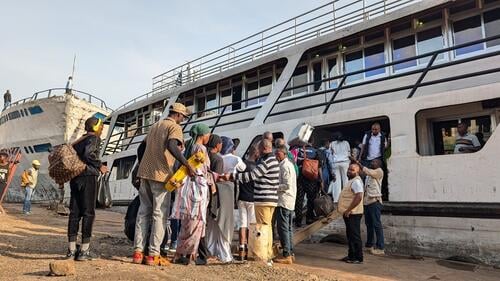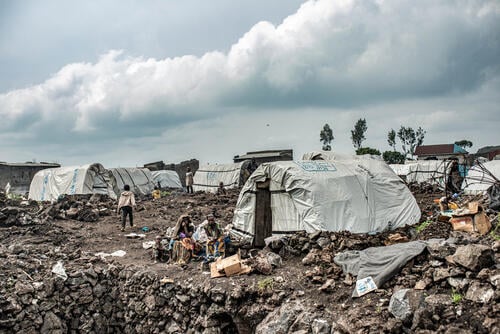- Unsanitary conditions and severe shortages of clean water are reaching critical levels in camps for displaced people in Goma, North Kivu province, Democratic Republic of Congo (DRC).
- The extreme level of unhygienic conditions poses serious risks for spreading diseases such as mpox and cholera.
- We urge aid organisations to address this catastrophic crisis immediately and prevent disease outbreaks.
After several months, unsanitary conditions and severe, life-threatening shortages of clean water continue to reach critical levels in various informal camps for displaced people around Goma, the capital of North Kivu province in Democratic Republic of Congo (DRC), warns Médecins Sans Frontières. MSF urges aid organisations with water, sanitation, and hygiene expertise to take immediate, sustained actions to address this catastrophic crisis and prevent outbreaks of life-threatening diseases in the rapidly expanding camps.
The ongoing conflict in North Kivu province between armed groups, including M23, and the Congolese armed forces has led to an unparalleled, massive increase in the number of people fleeing their homes over the past two years. Displacement has been continuing due to the intensity of the fighting. As of September 2024, an estimated 645,000 people were still sheltering in overcrowded camps around Goma.
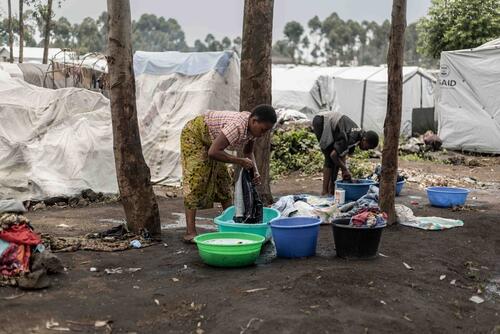
“Our teams continue to witness firsthand the devastating effects of the dire living conditions faced by displaced families,” says Natàlia Torrent, MSF head of mission in North Kivu.
Several months after the last large influx of people in February 2024, access to clean water, latrines and showers remains a major daily challenge for displaced people, especially in makeshifts camps.
“When we arrived here, our biggest worry was access to water – to drink, to clean, to cook, to bathe,” says Kahindo Salumu, who fled violence in her village earlier this year and now lives with her seven children in Rugo camp on the outskirts of Goma. “MSF has provided us with clean water, but it is insufficient. I draw three jerrycans of water per day, but by nightfall we have used every single drop.”
For the past two years, MSF has served as the primary water provider in the camps around Goma, significantly investing in sanitation infrastructures, including a solar-powered water supply system, a water pumping station and a faecal sludge treatment plant. To respond to the latest influx of displaced people, and to prevent putting pressure on existing resources, MSF has invested in water and sanitation activities in seven of the most recently formed informal camps on the western outskirts of the city, which shelter about 134,000 people.
This extreme level of unhygienic conditions remains alarming, especially as it poses serious risks of spreading infectious diseases such as Mpox, and water-borne diseases such as cholera.Natàlia Torrent, MSF head of mission in North Kivu
Despite this huge investment, data continues to highlight alarming gaps in water and sanitation services. Last month, displaced people in the camps around Goma received an average of only 7.8 litres of water per person per day, with some camps receiving only 2 to 4 litres per person. This is far below the international emergency requirements of 20 litres per person per day.
“This extreme level of unhygienic conditions remains alarming, especially as it poses serious risks of spreading infectious diseases such as mpox, and water-borne diseases such as cholera,” explains Torrent.
In 2022-2023, multiple cholera epidemics spread through the area, while the first cases of mpox have already been identified in 2024 among displaced people. DRC is currently experiencing a nationwide outbreak of the disease.
In addition to the water shortage, the number of showers and functioning latrines are vastly inadequate for people’s needs. Some makeshift camps have just one shower for 145 people, while MSF teams report that in some of them, 50 per cent of the latrines are either broken or over half-full. The first latrines were installed as an emergency measure; as a result, they typically fill up within a month, which make them unsustainable in the long term.
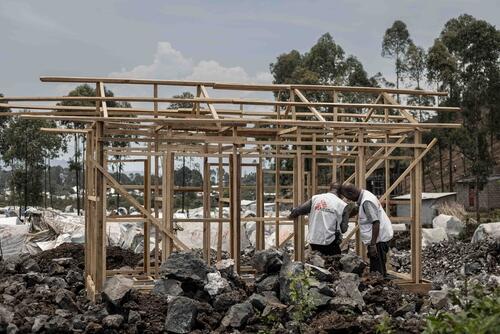
“We don’t have enough sanitation facilities, including latrines,” says Venasiya Rwata, who lives in Sam Sam camp with her seven children. “We are sometimes forced to leave our area to relieve ourselves in more distant places in the camp.”
Being forced to seek sanitation facilities in other camps or in more distant places can expose women and children to crime and violence, including sexual violence, which is prevalent within the camps.
With no end to the conflict in sight, MSF water and sanitation teams have focused on constructing more robust emergency infrastructure, including a more durable latrine design. Over the past months, MSF has constructed 2,334 latrines and 1,379 showers. Our teams are also working to increase the capacity of water supply systems and faecal sludge treatment sites operated by other organisations.
Despite repeated calls for mobilisation from MSF, the humanitarian response has been hindered by insufficient coordination and funding for organisations on the ground. This has resulted in critical gaps in meeting humanitarian needs, including in water and sanitation.
In light of this longstanding crisis, MSF urges international donors, governments, and other groups and organisations to ramp up their efforts and take over water and sanitation activities within the camps. As MSF is primarily a medical organisation, teams are operating at maximum capacity and need to focus on responding to medical needs.
“Immediate and sustainable action is needed now to avoid a public health crisis,” says Torrent.



